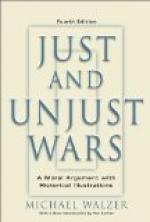They were there, he told them, to listen to certain facts that bore on the death of Archibald McBride. If, after hearing these facts, they could say they pointed to any person or persons as being implicated in the murder, they were to name the person or persons, and he would see that they were brought before the grand jury for indictment. They were to bear in mind, however, that no one was on trial, and that no one was accused of the crime about to be investigated, yet they must not forget that a cold-blooded murder had been committed; human hands had raised the weapon that had crushed out the life of the old merchant, human intelligence had made choice of the day and hour and moment for that brutal deed; the possibility of escape had been nicely calculated, nothing had been left to chance. He would venture the assertion that if the murderer were ever found he would prove to be no ordinary criminal.
All this Moxlow said with judicial deliberation and with the lawyer’s careful qualifying of word and phrase.
Shrimplin was the first witness. He described in his own fashion the finding of Archibald McBride’s body. Then a few skilful questions by Moxlow brought out the fact of his having met John North on the Square immediately before his own gruesome discovery. The little lamplighter was excused, and Colonel Harbison took his: place. He, in his turn, quickly made way for Andy Gilmore. Moxlow next interrogated Atkinson, Langham’s client, who explained the nature of his business relations with McBride which had terminated in the payment of three thousand dollars to him on Thanksgiving afternoon, the twenty-seventh of November.
“You are excused, Mr. Atkinson,” said Moxlow.
For an instant his eyes roved over the room; they settled on Marshall Langham, who stood near the door leading into the hall. By a gesture he motioned him to the chair Atkinson had vacated.
Langham’s testimony was identical with that which he had already given in the informal talk at Moxlow’s office; he told of having called on Archibald McBride with his client and, urged on by Moxlow, described his subsequent conversation with North.
Up to this point John North had felt only an impersonal interest in the proceedings, but now it flashed across him that Moxlow was seeking to direct suspicion toward him. How well the prosecuting attorney was succeeding was apparent. North realized that he had suddenly become the most conspicuous person in the room; whichever way he turned he met the curious gaze of his townsmen, and each pair of eyes seemed to hold some portentous question. As if oblivious of this he bent forward in his chair and followed Moxlow’s questions and Langham’s replies with the closest attention. And as he watched Langham, so Gilmore watched him.
“That will do, Mr. Langham. Thank you,” said Moxlow at last.




